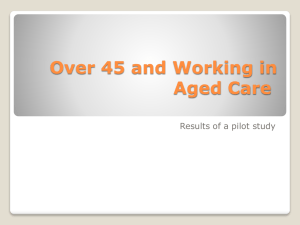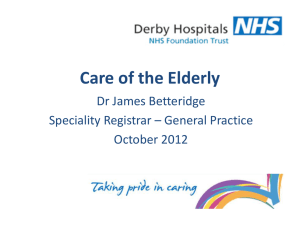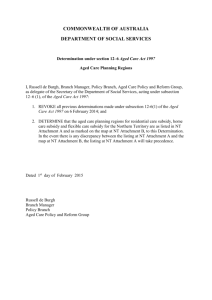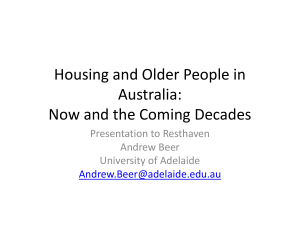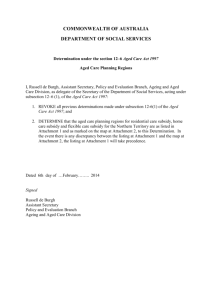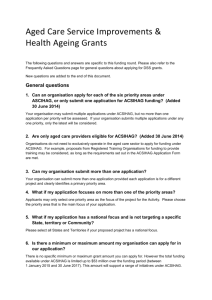Information for Aged Care Providers
advertisement
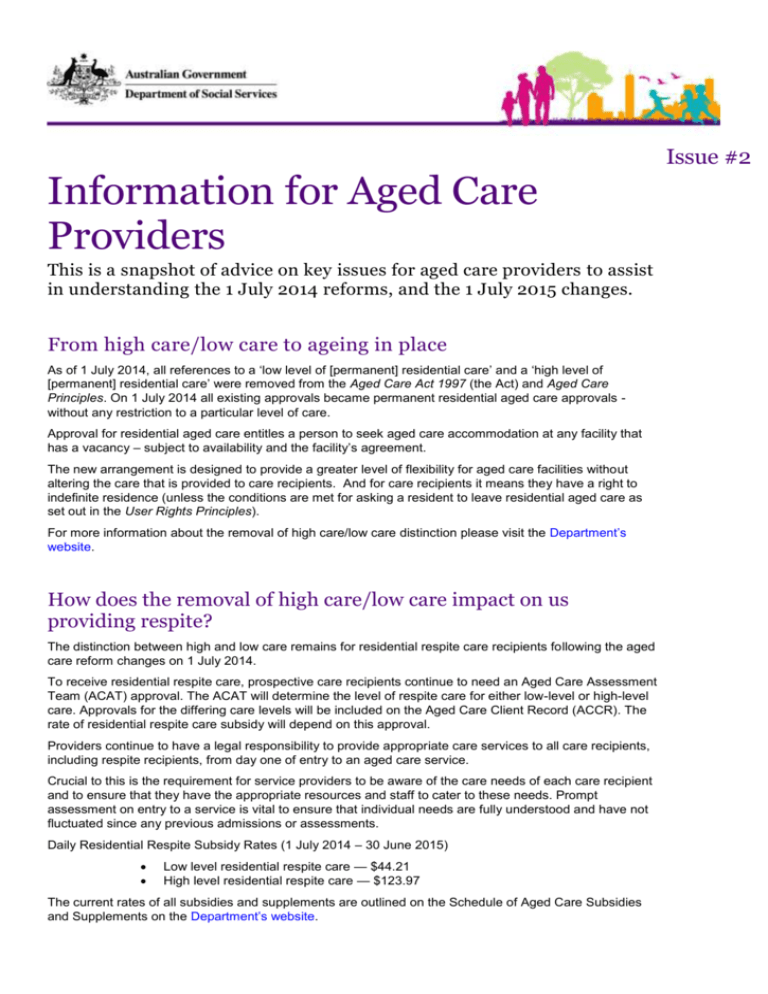
Issue #2 Information for Aged Care Providers This is a snapshot of advice on key issues for aged care providers to assist in understanding the 1 July 2014 reforms, and the 1 July 2015 changes. From high care/low care to ageing in place As of 1 July 2014, all references to a ‘low level of [permanent] residential care’ and a ‘high level of [permanent] residential care’ were removed from the Aged Care Act 1997 (the Act) and Aged Care Principles. On 1 July 2014 all existing approvals became permanent residential aged care approvals without any restriction to a particular level of care. Approval for residential aged care entitles a person to seek aged care accommodation at any facility that has a vacancy – subject to availability and the facility’s agreement. The new arrangement is designed to provide a greater level of flexibility for aged care facilities without altering the care that is provided to care recipients. And for care recipients it means they have a right to indefinite residence (unless the conditions are met for asking a resident to leave residential aged care as set out in the User Rights Principles). For more information about the removal of high care/low care distinction please visit the Department’s website. How does the removal of high care/low care impact on us providing respite? The distinction between high and low care remains for residential respite care recipients following the aged care reform changes on 1 July 2014. To receive residential respite care, prospective care recipients continue to need an Aged Care Assessment Team (ACAT) approval. The ACAT will determine the level of respite care for either low-level or high-level care. Approvals for the differing care levels will be included on the Aged Care Client Record (ACCR). The rate of residential respite care subsidy will depend on this approval. Providers continue to have a legal responsibility to provide appropriate care services to all care recipients, including respite recipients, from day one of entry to an aged care service. Crucial to this is the requirement for service providers to be aware of the care needs of each care recipient and to ensure that they have the appropriate resources and staff to cater to these needs. Prompt assessment on entry to a service is vital to ensure that individual needs are fully understood and have not fluctuated since any previous admissions or assessments. Daily Residential Respite Subsidy Rates (1 July 2014 – 30 June 2015) Low level residential respite care — $44.21 High level residential respite care — $123.97 The current rates of all subsidies and supplements are outlined on the Schedule of Aged Care Subsidies and Supplements on the Department’s website. Information for Aged Care Providers The Guide to Aged Care Law In conjunction with the recent changes to the Aged Care Act 1997 (the Act) and its subordinate legislation, the Department has identified an opportunity to enhance the way it presents information to aged care stakeholders. The Guide to Aged Care Law (the Guide) has now been released. The Department in consultation with aged care stakeholders developed the Guide as an online resource. It is designed to be an easy to use, plain-English text that will help assist approved providers understand their responsibilities and obligations under the Act. The Guide provides the Department with a platform to provide the latest information to aged care stakeholders relating to updates to the Act and its subordinate legislation. The Guide will provide information relating to: residential care; home care; flexible care; and residential respite care. The Guide can be accessed on-line at the DSS guides website. You may wish to add this URL to your internet favourites as a quick link to the Guide. Accommodation payment reforms: update on the delivery of transitional business advisory services In April 2014 KPMG started delivering transitional business advisory services to residential aged care providers. The advisory services are fully-subsidised by the Government and are intended to support providers through the transition to the new accommodation payment arrangements. The hotline established to support providers has been well received. However, enquiries received to the hotline so far suggest some providers are still adapting to the new way of thinking about accommodation payments and pricing. To further assist in this transition, we have added frequently asked questions received from providers on the Department of Social Services website. More frequently asked questions will be added over the course of the advisory services, and you will be notified of updates in future editions of this newsletter. The advisory services are available until June 2015, and residential aged care providers with operational places are encouraged to apply, either for over-the-phone assistance with one or more queries, or to have KPMG provide more comprehensive assistance specific to your circumstances. More information is available at KPMG's website (www.kpmg.com/au/tbas) or by calling the hotline on 1800 122 092. Carers Week - Sunday 12 October to Saturday 18 October Carers Week is an initiative by Carers Australia and the network of carers associations across the nation. The national event aims to recognise the essential role carers play in our community. Contact your local carers association for more information and events near you. For information on national events and resources available to support carers, please visit the Carers Australia website. Carers that require support or assistance, can contact Carers Australia on 1800 242 636 for information and advice to assist them in their caring role. 2
